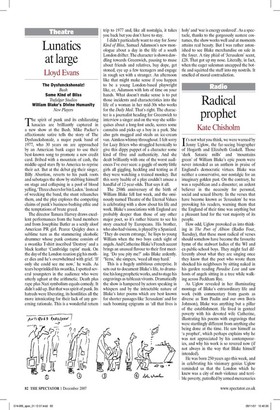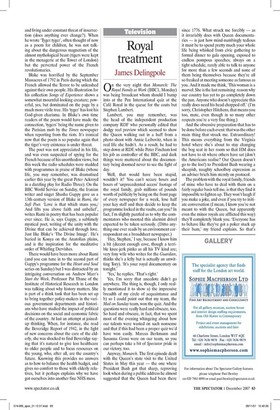Radical prophet
Kate Chisholm It's not what you think, we were warned by Jenny Uglow, the far-seeing biographer of Hogarth and Elizabeth Gaskell. Those 'dark Satanic mills' and 'mountains green' of William Blake's epic poem were never intended as an anthem in praise of England's democratic virtues. Blake was neither a conservative, nor nostalgic for an imaginary golden past. On the contrary, he was a republican and a dissenter; an ardent believer in the necessity for personal, social and sexual liberty. In the verses that have become known as 'Jerusalem' he was provoking his readers, warning them that the England of their time was anything but a pleasant land for the vast majority of its people.
How odd, Uglow provoked us into thinking in The Poet of Albion (Radio Four, Tuesday), that these most radical of verses should somehow have become the favourite hymn of the stalwart ladies of the WI and ex-public-school boys. They might feel differently about what they are singing once they know that the poet who wrote them shocked his neighbours by sitting naked in his garden reading Paradise Lost and saw hosts of angels sitting in a tree while walking across Peckham Rye.
As Uglow revealed in her illuminating montage of Blake's extraordinary life and work (with commentary from guests as diverse as Tom Paulin and our own Boris Johnson), Blake was anything but a pillar of the establishment. He lived in genteel poverty with his devoted wife Catherine, illustrating his poems with engravings that were startlingly different from anything else being done at the time. He saw himself as 'a prophet', which perhaps explains why he was not appreciated by his contemporaries, and why his work is so revered now (if not always in the way that Blake himself intended).
He was born 250 years ago this week, and in celebrating his visionary genius Uglow reminded us that the London which he knew was a city of mob violence and terrible poverty, patrolled by armed mercenaries and living under constant threat of insurrection (does anything ever change?). When he wrote `Tyger tyger', often thought of now as a poem for children, he was not talking about the dangerous magnetism of the almost mythological beast (tigers were kept in the menagerie at the Tower of London) but the perverted power of the French revolutionaries.
Blake was horrified by the September Massacres of 1792 in Paris during which the French allowed the Terror to be unleashed against their own people. His illustration for his collection Songs of Experience shows a somewhat mournful-looking creature; powerful, yes, but dominated on the page by a much more virile tree. His `tygef has lost his God-given charisma. In Blake's own time readers of the poem would have made the connection, `tygers' being the name given to the Parisian mob by the Times newspaper when reporting from the riots. It's ironical now that the poem is so popular again that the tiger's very existence is under threat.
The poet was not appreciated in his life, and was even suspected of spying for the French because of his unorthodox views, but this week the radio schedules were studded with programmes in praise of Blake (whose life, you may remember, was dramatised earlier this year by the great Peter Ackroyd in a dazzling play for Radio Three). On the BBC World Service on Sunday, the Iranian writer and singer Shusha Guppy gave us a 13th-century version of Blake in Rumi, the Sufi Poet. 'Love is that which stuns you,/ And lifts you above faith and unbelief', writes Rumi in poetry that has been popular ever since. He is, says Guppy, a sublimely mystical poet, writing of the unity with the Divine that can be achieved through love. Just like Blake's 'The Divine Image'. He's buried in Konya on the Anatolian plains, and is the inspiration for the meditative order of Whirling Dervishes.
There would have been more about Rumi (and you can tune in to the second part of Guppy's programme for the Heart and Soul series on Sunday) but I was distracted by an intriguing conversation on Andrew Marr's Start the Week. Professor Pat Thane of the Institute of Historical Research in London was talking about why history matters. She is part of a think tank that has been set up to bring together policy-makers in the various government departments and historians who have studied the impact of political decisions on the social and economic fabric of the country. At last an attempt at joinedup thinking. When, for instance, she read the Beveridge Report of 1942, in the light of new concerns about the care of the elderly, she was shocked to find Beveridge saying that it's natural to give less healthcare to older people and to focus resources on the young, who, after all, are the country's future. Knowing this provides no answers as to how to balance the health budget, and gives no comfort to those with elderly relatives, but it perhaps explains why we have got ourselves into another fine NHS mess.






































































 Previous page
Previous page